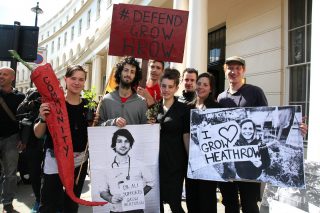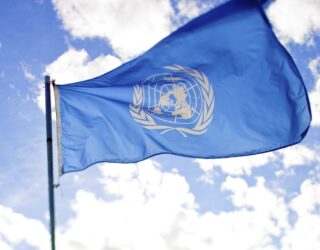The news that a climate change denier had been elected President of the US hit one group in London particularly hard. Grow Heathrow, a collective of environmental activists and squatters, heard the result during a morning meeting on November 9th.
They were preparing for a day’s work at ‘Grow Heathrow,’ a garden and camp from which the activists are protesting Heathrow airport’s expansion. Their poor wifi connection was no match for the arrival of that news, and its resulting depression passed quickly through the camp as people asked each other, “have you heard the news? Have you heard the bad news?”
“I’m worried he will really knock off track a climate movement that seems to gathering world-wide momentum”
Elsewhere in the capital, James Johnson, a graduate from Sheffield University was preparing his breakfast as Donald Trump’s victory sunk in. James led the movement to divest his university from fossil fuels, which then spread across Sheffield proper, making it the one of the most sustainable cities in the UK. His disbelief about Trump didn’t last long. Considering the toxic political atmosphere that led to Brexit, James wasn’t that surprised.
In contrast, over 1000 miles beyond the English Channel, time-worn environmental activist Philip Thornhill was in shock. He had been up all night watching the TV, thinking “Oh god, I can’t believe this” as he stared at the screen. He was in Lviv, Ukraine and immediately knew that he had to get back to London and do something about it.
On the last day of COP 22 in Marrakech, less than two weeks after the election, Philip was in London rallying people together for a last-minute protest outside the US Embassy, against Trump’s climate change denial. James was there among climate activists and the deputy leader of the UK Green Party, Amelia Womack. With a weary expression James explained: “I’m worried that he will really knock off track a climate movement that seems to be gathering world-wide political momentum.”
Trump attempted to backtrack on previous comments but flip-flopped into vague rambling
Womack also spoke to the small crowd outside the embassy. Her fears were similar to those James had expressed. “After so much incredible, historic, international cooperation,” she said, “I’m worried that Trump will just create a wrecking ball through all of that work, set us back ten years and allow the most vulnerable, poorest members of our global communities to experience the worst effects of climate chaos.”
Cyrille Zeldine, an activist who has dedicated many years to fighting climate change, held a banner that read: “Trump: Climate Genocide.”
“I’m worried that Donald Trump is going to take the US out of the Paris climate accord,” Zeldine said. “I’m worried that he’s going to go back on Obama’s work with China. Those two countries form almost 50 per cent of global emissions. So if that falls through the international level is likely to take a huge hit. I’m worried about his future appointment with the European Environment Agency, when he’s a climate sceptic, and I’m worried about his rashness, and that he might respond quite instinctively without necessarily taking in all the facts.”
Beside promising to withdraw the US from the Paris Climate Agreement, Trump wants to return to dependence on shale, oil, gas and coal, undoing much of the work Obama has done to move toward clean energy. By divesting of fossil fuels in several industries, Obama reduced American emissions by around 14 million metric tonnes of CO2 and provided enough electricity for more than one million homes.
“We got together at short notice because I couldn’t sleep without doing something”
All his work could be reversed by a president who does not believe that climate change is happening. Trump’s climate change denial was highlighted in the run up to the election, because in 2012 he tweeted: “the concept of global warming was created by and for the Chinese in order to make U.S. manufacturing non-competitive.”
At his recent unrecorded skyscraper meeting with journalists, the president-elect attempted to backtrack on this but flip-flopped into vague rambling that failed to inspire commentators of any persuasion.
At the protest in London, Philip addressed the modest crowd. “Thanks for coming on this grim occasion. We got together at short notice because I couldn’t sleep without doing something, having heard the news that we have a proto-fascist, climate denier as President elect in America.”
He attempted to lead the small crowd in a chant, shouting, “Donald Trump, climate genocide! This is genocide! Wrecking global climate action is genocide!” without much success with the audience. Later, James lamented not only the low turnout but also the minimal global involvement in the wider climate movement:
“I fear the anti-climate change movement should be bigger and more effective than it is. It’s nothing like political movements we’ve seen before, like anti-apartheid, or the great reform bill. It’s NGOs thinking they can niggle about and have some impact. It’s not building a big, angry, energetic movement.”
Perhaps Philip’s distress would have been somewhat soothed if he had visited ‘Grow Heathrow’ and seen the activity there. The morning before the protest, the anti-airport expansion demonstrators were bustling with activity, working harder than ever to prepare for another protest the next day, at which 15 people would be arrested for blocking a motorway near the airport.
At the camp, Simon Jennings sat in one of their greenhouses beside a pile of cardboard sheets for making banners. “Do I think that we have a future as a species? No, frankly. Do I think it’s worth fighting anyway? Yes because I could be wrong,” he said, then adds quickly, “I hope I’m wrong.”
The initial distress caused by Trump’s election nevertheless failed to puncture Grow Heathrow’s optimism. “We can still win. It’s always worth fighting rather than giving up. If you don’t fight you don’t win,” said activist Ali Pearson, sitting next to Simon. Another resident at the camp, Gomez Apellido, was cooking lunch for everyone. “Trump’s election could inspire us to fight harder,” she said, “because at least now there is a face of what is anti-climate change activism and that could also bring people together.”
The future of climate activism might not be as bleak as some initially felt. But the task ahead remains monumental. “Find each other, get active, get mobilised,” advised Ali with a determined frown. “A few people can have a huge impact on anything. It only takes a few people to block roads, train lines, runways, power stations. So find your friends. Find the skills and do it. Find other people and support other groups.”
At the embassy protest, Amelia Womack also emphasized the need for collective action:
“We do need to have that united voice and whatever happens within the EU, stronger ties with Europe will be important at this time to make sure we are keeping the environment and climate change on the agenda and working across borders, across parties, and even across communities to make sure that our message is loud and clear.”
Reactions of dismay and depression among climate activists seem to be balanced with a heightened determination. The progress toward curbing global warming may well suffer a severe setback under a climate sceptic president, but it isn’t going to halt activists in their mission to save the planet from environmental catastrophe.
Image: Transition Heathrow



